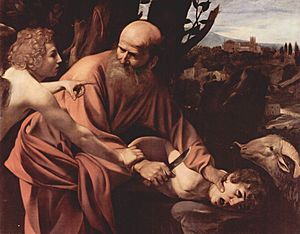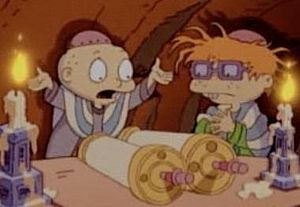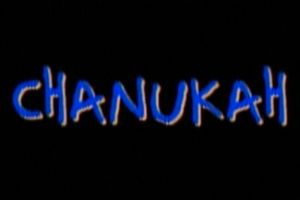Judaism in Rugrats facts for kids
The animated TV show Rugrats is well-known for showing Jewish culture and traditions. This was quite unique for American cartoons when the show first aired from 1991 to 2004. Six special episodes of Rugrats focused on Jewish holidays and explained their history. The main family, the Pickles, is also shown to be partly Jewish.
The idea for a Rugrats Jewish holiday special came from Nickelodeon in 1992. They first suggested a Hanukkah episode. However, the show's creators decided to make a Passover episode first. The Hanukkah special came out later in 1996. People generally liked how Rugrats showed Jewish themes. The holiday specials were very popular and got good reviews. However, a Rugrats comic strip in 1998 showed Grandpa Boris in a way that some people found offensive.
Contents
Jewish Culture in Rugrats
How Jewish Themes Started
Jewish themes in Rugrats come from Boris and Minka Kropotkin. They are Tommy Pickles's great-grandparents on his mother's side. Boris and Minka are Russian Jewish characters. They follow traditional Jewish customs and speak with strong Yiddish accents. Because of them, Tommy and the Pickles family take part in several Jewish activities. This is especially true during holidays. While Boris and Minka practice their faith regularly, the Pickles family usually only takes part in religious activities during big holidays.
Rugrats TV Show (1991–2004)
A Rugrats Passover (1995)
"A Rugrats Passover" was a special episode in 1995. In this episode, Tommy, Phil, Lil, Chuckie, and Angelica visit Boris and Minka's house. They are there to celebrate Passover Seder. Boris accidentally locks everyone in the attic. While they are stuck, Boris tells the story of Exodus. The babies imagine themselves as characters from the story. Tommy sees himself as Moses, and Angelica imagines herself as the pharaoh.
A Rugrats Chanukah (1996)
"A Rugrats Chanukah" aired in 1996. In this episode, Tommy's Jewish grandfather, Boris, tells the babies the story of the Maccabean Revolt. The babies imagine themselves as Biblical characters. Tommy sees himself as Judas Maccabeus. The episode also mentions the song "I Have a Little Dreidel" and the tradition of giving chocolate coins. This episode was very important because it was the first time a children's TV show aired a Hanukkah special. At the time, most children's shows only released Christmas-themed episodes during the holiday season.
The Rugrats Movie (1998)
The Rugrats Movie came out in 1998. This animated film introduced Tommy's younger brother, Dil. The movie might have a hidden reference to Judaism. At one point, Tommy almost sacrifices Dil to hungry monkeys. He pours banana baby food on Dil. This scene is similar to the Sacrifice of Isaac, a famous story from the Bible.
All Grown Up! (2003–2008)
All Grown Up! was a show that continued the Rugrats story. It followed the characters as teenagers. In this show, Tommy is 11 years old. He seems less interested in his Jewish background. In one episode, Tommy argues with his mom, Didi, about going to Hebrew school. He doesn't want to go until he develops a crush on a classmate named Rachel. Rachel is very religious, but Tommy knows very little about Judaism. He doesn't know about shabbat (the day of rest) and has never followed a kosher diet. Tommy's younger brother, Dil, is also not interested in Judaism. To avoid Hebrew school, he even starts his own religion. This portrayal of Tommy and Dil's lack of interest was realistic for the time. In 2006, studies showed that young American Jews were becoming less interested in religion.
Behind the Scenes
Boris and Minka were inspired by the great-aunts and uncles of Rugrats co-creator Arlene Klasky. Arlene Klasky herself is Jewish. She felt it was very important to include Jewish themes in the show. She especially wanted to show that Tommy's mother, Didi, was Jewish and his father, Stu, was Christian. Klasky believed it was important to show this difference in families. She grew up with a Jewish mother and a non-Jewish father.
Boris and Minka first appeared in the very first Rugrats episode, "Tommy's First Birthday." Melanie Chartoff, who voiced Minka, was already cast as Didi. She was then asked to try out for the role of Minka. Chartoff felt the character description for Minka was a bit too stereotypical. However, she still wanted to try for the role. When she read the lines, she found it hard to understand Minka's personality. She realized that even though Jews created the show, this specific script wasn't written by them. So, she took a break to research her own family history. This helped her create Minka's unique voice and personality.
In 1992, Nickelodeon suggested making a Hanukkah special for Rugrats. However, the show's executive producer, Germain, decided to make a Passover special instead. He thought it would be a "funny idea" and "historically interesting." When writing "A Rugrats Passover," the writers had to be careful. They needed to make sure the story of the Ten Plagues was not too scary for children. Because "A Rugrats Passover" was so successful, the Rugrats team decided to create "A Rugrats Chanukah." One of the writers for the Hanukkah episode, David N. Weiss, had recently converted to Judaism.
Images for kids
See also
 In Spanish: Judaísmo en Rugrats para niños
In Spanish: Judaísmo en Rugrats para niños







